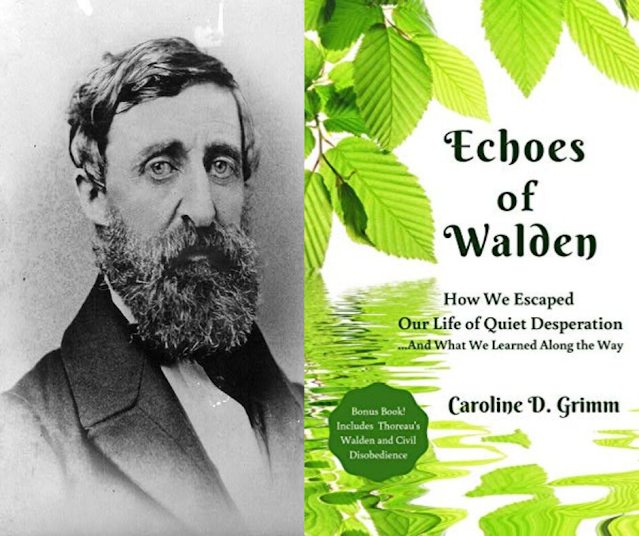 |
| Echoes of Walden is FREE with Kindle Unlimited! |
by Michael Corthell
"A man is rich in proportion to the number
of things which he can afford to let alone."
of things which he can afford to let alone."
— Henry David Thoreau, Walden
Why not choose a less complex life?
Becoming a minimalist isn't just the paring down of possessions, even though that is a the big part of it. It is also an internal state of mind. Minimalism is a road trip — a journey of self-growth. At the end of that path is a life of peace and abundance.
Simplify what you wear. Do you really need all those clothes? Multiples of each type? Where do you shop? Think thrifty, think thrift shops!
Money. How much do you really need?
Your work. Please note that people who really love their jobs tend to dive into it, regardless of how much they make. If you earn a little less you...buy fewer THINGS.
Food. Eat less, eat right. My advice is to consume a plant-based diet, a 100% non-animal diet. The evidence is overwhelming to me that animal products trigger disease. Veganism is the original human diet. God said, “I am giving you all the grain-bearing plants and all the fruit trees. These trees make fruit with seeds in it. This grain and fruit will be your food.'' — Genesis 1:29
Community. Be a part of it. We human beings crave connection with our people. Get out there and get involved. Volunteering your time is very cost-effective plus it's good for your soul. You will be abundantly blessed in so many ways. Connect!
Your home. Reclaim it, clean it, get comfortable in it. Caring for something, like a child, a pet, anything makes us feel attached to it. Your home is no different. When you make housework a priority, you’ll find that your home becomes your comfortable nest, your sanctuary.
“There are two ways to increase your wealth. Increase your means
or decrease your wants. The best is to do both at the same time.”
or decrease your wants. The best is to do both at the same time.”
— Benjamin Franklin.
Know the difference between 'wants' and 'needs'. A need something you have to have; water, food, clothes, shelter etc. A want is something you would like to have; the latest fashion, a new car etc.
Understanding this is all-important for our discussion of living an abundant life through minimization and simplicity. Just appreciate and be grateful for what you have.
What do you need?
Echoes of Walden is FREE with Kindle Unlimited!
__________
Thoreau and Civil Disobedience
Henry David Thoreau not only wrote Walden; he is also responsible for a small booklet titled Civil Disobedience, which recommends that – when a US president is taking a wrong turn – good citizens have a duty to protest.
~

Comments
Post a Comment